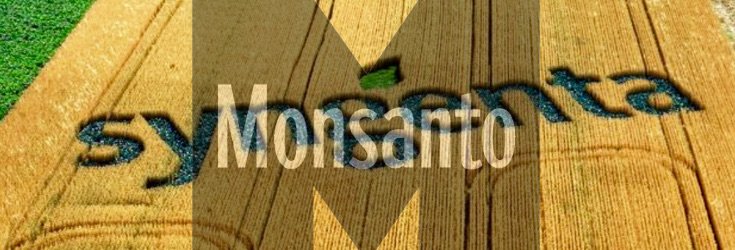Two Major Biotech Companies May Soon Merge into ‘Mega Monsanto’

What would you get when you combine 2 of the largest chemical-biotech-seed companies on the planet? We may just find out soon enough, as biotech juggernaut Monsanto is reportedly looking to take over another big player in the biotech field, Syngenta. The merge would likely result in the further monopolization of the food supply – with GMOs and chemical pesticides at the crux.
According to 2 individuals who have asked not to be identified discussing private information, Monsanto has approached Syngenta in recent weeks to discuss a takeover of the company. However, Syngenta does appear hesitant, citing issues such as antitrust hurdles and failing to reach an agreement. Keep in mind that Syngenta is worth a whopping $35 billion, while Monsanto has a market value of about $58 billion.
As of now, chemical companies Bayer AG, BASF SE, and Dow Chemical a larger players than Monsanto. And while Monsanto has the hold on the seed market, Syngenta is still the world’s largest maker of crop chemicals. But with the fuse of Syngenta and Monsanto, Monsanto would become the golden player in the GMO seeds and chemical arena. What would come next is undoubtedly a multitude of more crop chemicals, more GMO seeds, more control over our food supply, and more shutting down of GMO labeling initiatives.
But will the takeover go through? This isn’t the first time Monsanto approached Syngenta with such an endeavor, but perhaps things will be different this time as Syngenta has reportedly not seen meaningful growth since 2012.
As reported by Bloomberg:
“Because Syngenta’s operating earnings have ‘failed to progress meaningfully since 2012, and the shares have underperformed the broader EU chemicals space, it is unsurprising that M&A speculation has once again resurfaced,’ Morgan Stanley analysts Paul Walsh and Charles Webb said in a note. In terms of potential antitrust issues, the largest business overlaps are the North American and Latin American herbicide markets as well as seeds in North America, they said.
The companies held preliminary talks last year with advisers about a combination, before Syngenta’s management decided against negotiations, people familiar with the matter said at the time. No agreement was made after concerns were raised about the strategic fit, antitrust issues and relocating the company.
To address antitrust issues, Monsanto has planned for a deal that would include a sale of portions of the combined business, one of the people said Thursday. The U.S. company last year reached out to potential bidders of those assets, including Bayer, this person said.”
Nobody Likes Monsanto
Back in 2011, NaturalSociety declared Monsanto to be the worst company of the year for threatening both human health and the environment at large. Our decision was met with massive support, even amid the still growing climate of understanding when it came to what Monsanto and mega biotech at large were truly doing to the food supply.
In 2014, a poll from Nielsen found that Monsanto’s reputation ranked 3rd worst among 60 high-profile companies, right behind oil juggernaut BP (responsible for the worst oil spill in U.S. history) and Bank of America (known for being a key player in the meltdown of the financial market).
Though while Monsanto has gained the spotlight for worst company ever, let’s not pretend that Syngenta and the rest of the biotech crew is any better. As Monsanto creates the best-selling herbicide Roundup, Syngenta is responsible for creating the second largest selling pesticide in the world, Atrazine. In addition to this toxic chemical running rampant on crops, the run-off (from over 80 million pounds used annually) ends up in streams, rivers, and often our drinking water.
We also reported on how Syngenta may have single-handedly ruined the US corn industry with their GMO corn variety, only to face a billion-dollar class action suit in three states after China has refused US corn exports repeatedly.
While letting these two companies run their businesses apart is destructive enough, letting Monsanto become ‘Mega Monsanto’ will only prove to further contaminate a global food supply taken over by a chemical giant.
